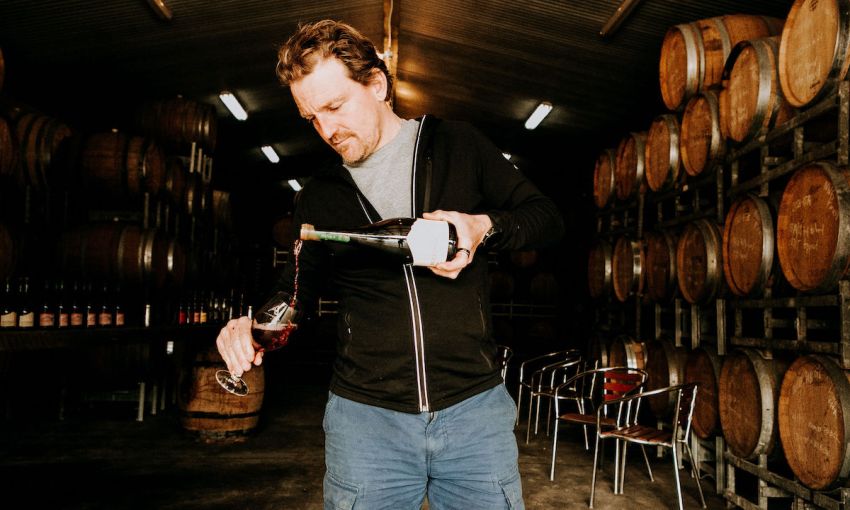Winemaker Erinn Klein and his wife Janet, a viticulturist, were ahead of their time when they founded their Adelaide Hills biodynamic vineyard and farm Ngeringa, which now also grows restaurant-quality garden produce.
Three minutes with Erinn Klein
BEN How did you and Janet meet?
ERINN We met while studying oenology and viticulture at the University of Adelaide in 2000. Our shared belief in traditional, non-chemical farming, our inclination to think out of the box and our energy for getting things done have always made us the great team we are.
BEN How did you become a winemaker?
ERINN I knew a wonderful man who shared with me his passion for winemaking not long after leaving school. I didn’t enjoy my undergraduate marketing degree and the notion of making wine was so much more appealing.
BEN What is your ethos at Ngeringa?
ERINN We are passionate about ecological, biodynamic wine growing where the soil, the site and the season are allowed to be expressed in the wines.
BEN Tell me about your “whole farm” approach to winemaking?
ERINN We are a mixed farm where we aim to be as self-sufficient as possible and where nutrients are recycled between the winery, vineyard and farm with sheep in the vineyard and cattle in the paddocks. Native grasses and flowering plants provide insect habitat for predatory insects within the vineyard and the surrounds. We grow our own hay, make compost and complement our winegrowing with a significant commercial vegetable garden.
BEN Your parents Ulrike and Jürgen first bought the farm to grow organic herbs for their skincare brand Jurlique – what did you learn from them?
ERINN Growing up on the farm as kids we were always quite hands-on, putting out BD500 or horn manure, making compost with the BD preparation, planting, weeding and picking and helping with livestock. We grew up without chemicals on the farm or in the house, so when we took over Ngeringa and planted our first vines we had the inherent belief that farming this way was the best way forward. We also learnt a lot from visiting organic growers in Europe who – 20 years ago – were far ahead of viticultural practices in Australia.
BEN How do you manage all of your different wine varieties as well as olive oil, cider, biodynamic produce and livestock?
ERINN Farming is seasonal and cyclical. Each of these products has its own time to shine and require attention. Each is as exciting every year as the last.
BEN What restaurants do you sell your fruit and veggies to?
ERINN Africola, Arkhé, Fishbank, Press, Coriole, Stirling Organic Market, Anchovy Bandit, The Stanley Bridge Hotel, Ruby’s Organic Cafe, Rise Artisan Bakery, The Scenic Hotel, The Stag Hotel and Fino Vino.
BEN How do your beautiful Scottish Highland cows fit into the picture at Ngeringa?
ERINN Janet has Scottish heritage and together we believe in the symbolism of a cow with their complete horns connecting them from earth to heaven, as per the biodynamic theory. They are majestic, freespirited creatures. One of the key biodynamic preparations/tonics is BD500, a “cured” cow manure buried in cow horns over winter. We keep our cow horns when our cows naturally pass on and use the manure for compost.
BEN Since 2007, you’ve been working on a property-wide revegetation program – what have been the results?
ERINN We have made significant changes to our local landscape by planting back native trees, shrubs and grasses across Ngeringa. By removing stock from some paddocks, we’ve also allowed the natural regeneration of other species still in the soil. In 2020, we also trialled native grasses within the vineyard with much success thanks to an EcoVineyard grant. Our farm is alive … the soil is healthier, moister and cooler. Many woodland bird species known to be in decline across our region can be found here, but weren’t before. The vineyard also benefits thanks to the good bugs that prey on typical vineyard pests using these natives as habitat.
BEN Something most people don’t know about you and Janet?
ERINN I have ridden my bicycle to Uluru three times as part of Race to the Rock, while Janet has just completed a research project at Flinders University investigating microplastics along the South Australian coastline.
BEN If you were a wine, what would your label say?
ERINN Always young at heart with ever-increasing complexity.
This article first appeared in the May 2022 issue of SALIFE magazine.



